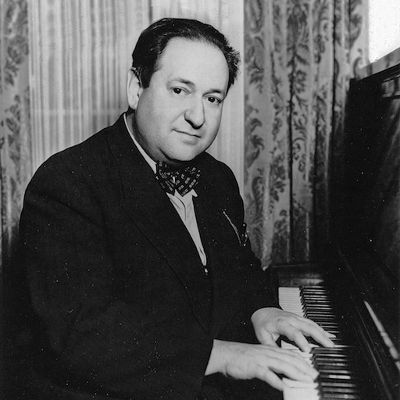

Morovian composer Erich Wolfgang Korngold was a child prodigy, talented German opera composer, and celebrated throughout Hollywood for his film scores. With lyrical melodies, virtuosic orchestration, and rich textures, Korngold’s compositions embrace his theatrical background by incorporating an extensive use of leitmotifs. When composing for the screen, his theatrical background also came into play by his technique of playing the compositions for the actors during the filming process so they might match its tone and rhythm with their movements.
Born in Moravia in 1897, Erich Wolfgang Korngold was the second son of Julius Korngold and Josephine Witrofsky. His father’s profession as a music critic would quickly have the family moving to Vienna in 1901. In 1904, Korngold’s father became the chief music critic for the Neue Freie Presse which he held until 1934. Korngold began his musical instruction at home by age three and, by age six, he was sketching musical ideas in a notebook at which point his father, recognizing the boy’s talent, sent him to study under Robert Fuchs at the Vienna Conservatory. In 1906, Korngold had the opportunity to play some of his pieces for Gustav Mahler, who declared him a boy genius and instructed him to abandon his formal academics and study privately with Alexander Zemlinsky. Korngold studied with Zemlinsky until 1911.
Korngold’s fame across Europe began in 1910 when an orchestrated version of Der Schneemann (The Snowman) was played, first, at the Hofoper and then quickly to more than thirty stages across Austria and Germany. With his reputation growing, Korngold completed his first opera Der Ring des Polykrates (The Ring of Polycrates), a one-act comedy, in 1914 which was to be performed alongside its companion piece, Violanta, a one-act tragedy. These two pieces quickly gained him recognition as a leading name in contemporary German opera. Korngold escaped active duty during World War I when a doctor recognized him and excused him from service on the front lines and, instead, worked in archives, led the company band, and held performances of his own to raise money for the Austrian War Relief Fund.
In 1920, Korngold’s opera Die tote Stadt (The Dead City) premiered simultaneously in Hamburg and Cologne with performances in Vienna and the Metropolitan Opera (the first German opera to be performed there after the end of World War I). Throughout the 1920’s, Korngold continued to compose, focusing on songs, chamber music, and commissions. He had his sights set on starting a family so he began looking for more financially lucrative compositional opportunities which eventually landed him in the company of Max Reinhardt who invited him to collaborate on a new production of Die Fledermaus in Berlin. Reinhardt fled Europe in the early 1930’s and, in 1934, invited Korngold to join him in California to collaborate on a film adaptation of A Midsummer Night’s Dream. While Korngold did accept the offer, he only did so after first declining and then, seeing the social climate taking a turn, accepted and he and his wife, Luzi, set sail for the United States.
For four years Korngold travelled regularly between California and Vienna and, in 1938, after arriving back in California, Korngold received word that his property had all been seized by the Nazi party with his family (including his oldest son, parents, and in-laws) escaping just in time. While his father attempted to save as much of his work as possible, he was unable to save everything. Fortunately, two representatives from the Josef Weinberger publishing house were able to break into the Korngold home and retrieve his sketches and autographs and send them to Korngold in California. During Hitler’s reign, Korngold boycotted composing anything for the opera or the stage and focused primarily on his compositions for the screen. His career with Warner Bros. lasted from 1934 to 1946, during which time he composed a total of eighteen original scores. He set the tone and standard for film scores, keeping the dialogue always audible above the music, keeping the action rhythmically in harmony with the music, and composing the music to match the emotional drama or comedy happening on screen.
In 1945, Korngold’s father died and the war drew to a close which turned Korngold’s focus back toward composing for the concert and theatrical stages. Erich Korngold suffered a stroke in 1956 and died in 1957.